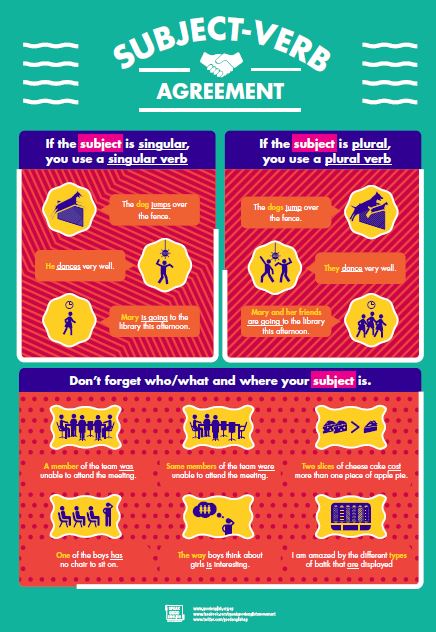
Click on the thumbnail above to view/download the Subject-Verb Agreement Poster
Singular nouns go with singular verbs while plural nouns go with plural verbs.
Match your noun with the correct verb.
Concorde or Subject-Verb Agreement
Have you ever wondered why we say, She looks very pretty and not She look very pretty? The answer lies in grammar rules on concord or subject-verb agreement. The basic rule is that singular verbs must agree with singular nouns, while plural verbs must agree with plural nouns. What is a noun? It is a word to name people, places, events, things or ideas.
E.g.
- teacher, Orchard Road, party, basket, beauty.
How do you recognise a singular or plural verb?
A singular verb is one that has an s added to it in the present tense, such as writes, plays, runs, and uses forms such as is, was, has, does. A plural verb does not have an s added to it, such as write, play, run, and uses forms such as are, were, have and do.
E.g.
- Jack (singular noun) enjoys (singular verb) playing golf every Sunday.
- The mm (plural noun) enjoy (plural verb) playing golf every Sunday.
In the case of pronouns, he, she and it take a singular verb while you, we and they take a plural verb.
We (plural pronoun) think (plural verb) that she (singular pronoun) is (singular verb) innocent.
However, there are exceptions to the rules mentioned earlier.
If the two nouns joined by and represent a singular idea, then the verb is singular.
E.g.
- Bread and butter is available on request.
- Fish and chips is my favourite meal.
Problems also arise when the speaker or writer is faced with more than one noun or pronoun in the sentence.
E.g.
- The quality of our students’ essays has fallen drastically.
In this case, the verb “fallen” agrees with the subject (first noun mentioned) or head noun of the noun phrase, “quality”.
Similarly, in the following example, “The spokes of that wheel are broken.”
The subject of the sentence is spokes (plural head noun), hence the plural verb, are.
When a singular and a plural noun or pronoun (subjects) are joined by or or nor,the verb should agree with the subject nearer the verb.
E.g.
- The girls or their father collects the newspapers every morning.
- In this example, the singular verb, collects agrees with the noun closest to it, the singular noun, father.
People often get confused when deciding whether a singular or plural verb should agree with some collective nouns.
E.g. Should we say,
The football team are (plural verb) ready for their photograph?
OR
The football team is (singular verb) ready for its photograph?
Well, it all depends on whether we are thinking of the team as a single collective unit or as individuals. If it is the former, then the verb should be singular. However if we are considering the team as comprising individual members who are not acting as a single unit, then we use the plural verb.
Other examples:
- My family (considered as a collective unit) comes from Kuala Lumpur.
- The audience (considered as individuals) were clamouring for more songs but the singer left the stage.
- Your bunch of keys (considered as a collective unit) is next to the door.
A point to note is that American English almost always treats collective nouns as singular, hence a singular verb is used with it.
Nouns which have two parts such as spectacles, scissors or pants require plural verbs.
E.g.
- My spectacles are missing.
- These scissors need sharpening.
However, when regarded as a pair, a singular verb is used.
E.g.
- My pair of spectacles is missing.
- This pair of scissors needs sharpening.
There are some occasions when we should use singular verbs. Expressions such as each of, one of, anybody, each, every and nobody must be followed by a singular verb.
E.g.
- Each of the ladies has a designer handbag.
- Anybody is allowed to enter this hall.
- Nobody is disappointed with the results.
A singular subject with attached phrases introduced by with or like or as well as is followed by a singular verb.
E.g.
- The boy, with several others, was late for school.
- Meiling, like Johan, is tall for her age.
- Tom, as well as Fred,is on the first shift.
Two singular nouns or pronouns separated by either … or or neither … nor take a singular verb.
E.g.
- Either he or she has eaten the cake.
- Neither Meera nor Gopal knows anything about the accident.
Amounts, even if plural, have a singular verb.
E.g.
- Sixty dollars is too much to pay for that dress.
- Ten kilometres is too long a distance for me to walk.
- Five kilogrammes of flour is all that I need for my baking.
There are some occasions when we should use plural verbs.
When two or more plural subjects are connected by “and”, the verb is plural.
E.g.
- The officers and his men were patrolling the area.
- Domestic cats and dogs need adequate care and attention.
Plural subjects separated by either…or or neither … nor,both …and, and all but take a plural verb.
E.g.
- Either the boys or the girls are to blame.
- Neither the contestants nor the audience were aware of the fire.
- All but Sam are going to the cinema.
- Both the twins are attending their graduation ceremony.
Another problem that users of English face is this: does the verb in a sentence agree with the noun (subject) before it or the noun or adjective after it (complement)?
The answer is that it should agree with the subject – the noun before it.
E.g.
- The thing (subject) we need at this moment is (verb) more eggs.
- The greatest benefit (subject) is (verb) the opportunities presented to our staff.